2017初中英语八种时态归纳表格
- 格式:doc
- 大小:53.50 KB
- 文档页数:3
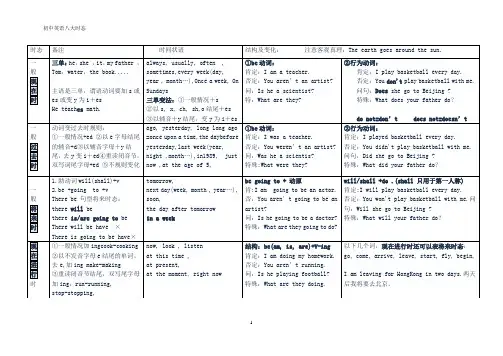
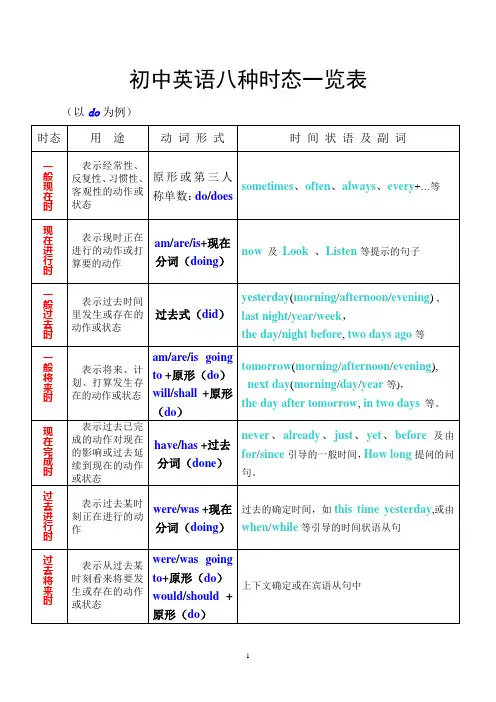
初中英语八种时态一览表(以do为例)例句:1. He often reads magazines after class.2. Tom always wants to go swimming in summer.3. Lucy has a twin sister Lily.4. There is a big tree in front of our classroom.5. People sometimes make friends by doing exercise.6. We have an English class on Mondays.7. The boy is tall.8. Three times three is nine.9. We began to learn English two years ago.10. I was glad to get your letter.11. When Edison was a child, he often asked questions.12. I will be here at ten o’clock tomorrow.13. I am going to see him next Tuesday.14. Shall I open the window?15. I am writing a letter now.16. We are preparing for the exams.17. He is leaving for Beijing next week.18. The rain has stoppe d already.19. I have never seen such a film before.20. I haven’t seen him for three days.21. He has lived here since 1992.22. I have seen this film three times.23. What were you doing at 9:30 yesterday morning?24. I was writing while he was reading.25. He said he would go to Shanghai soon.26. We had learnt over 1200 words by the end of last term.27. He had gone home before I got to his office.28. He said he had returned the book to the library.练习:用所给的动词的适当形式填空。

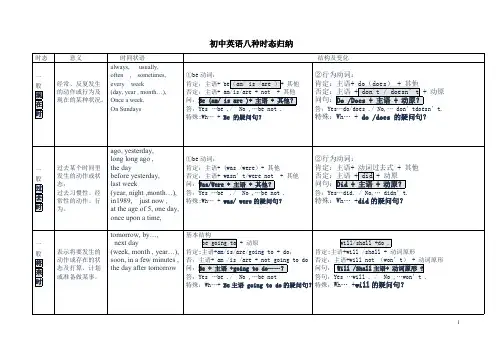
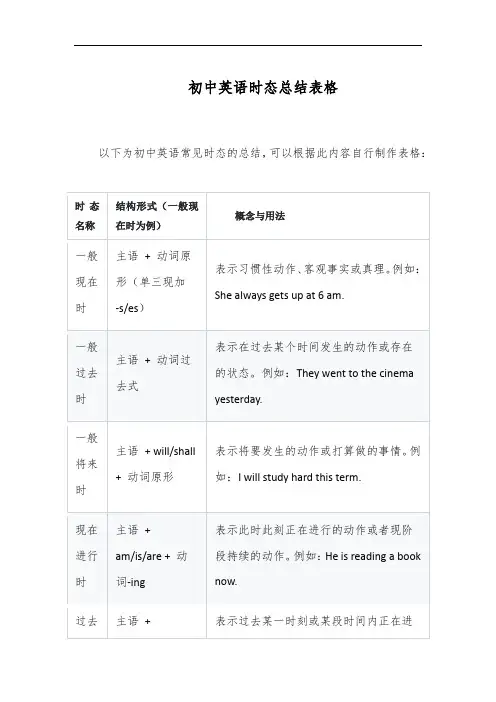
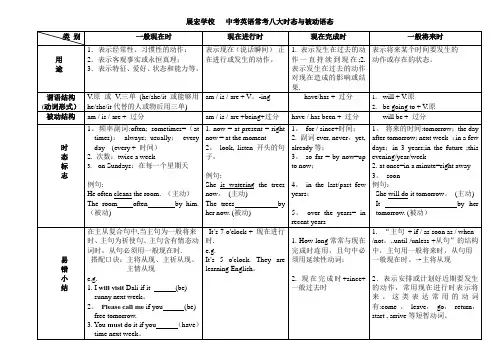
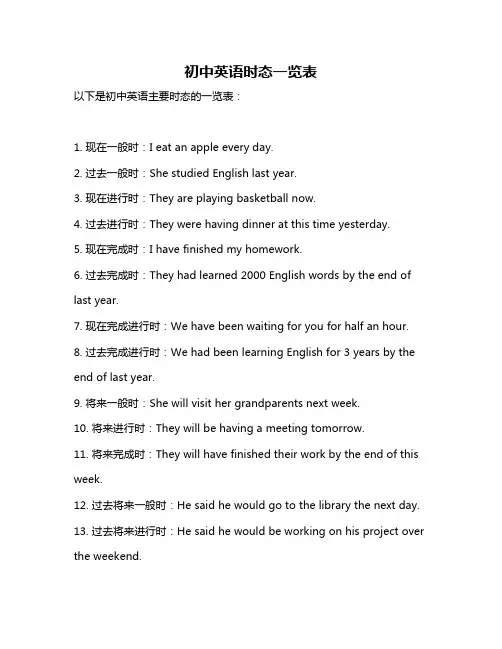
初中英语时态一览表以下是初中英语主要时态的一览表:1. 现在一般时:I eat an apple every day.2. 过去一般时:She studied English last year.3. 现在进行时:They are playing basketball now.4. 过去进行时:They were having dinner at this time yesterday.5. 现在完成时:I have finished my homework.6. 过去完成时:They had learned 2000 English words by the end of last year.7. 现在完成进行时:We have been waiting for you for half an hour.8. 过去完成进行时:We had been learning English for 3 years by the end of last year.9. 将来一般时:She will visit her grandparents next week.10. 将来进行时:They will be having a meeting tomorrow.11. 将来完成时:They will have finished their work by the end of this week.12. 过去将来一般时:He said he would go to the library the next day.13. 过去将来进行时:He said he would be working on his project over the weekend.14. 过去将来完成时:He said he would have written the report by the end of the month.希望这个一览表能帮到你!如果你还有其他问题,请随时提问。

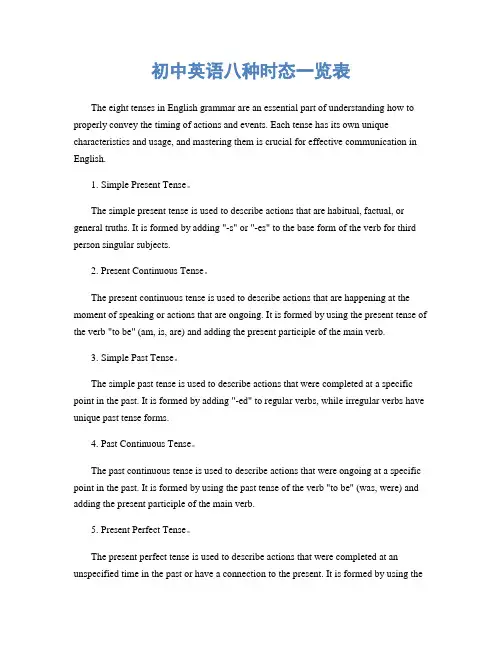
初中英语八种时态一览表The eight tenses in English grammar are an essential part of understanding how to properly convey the timing of actions and events. Each tense has its own unique characteristics and usage, and mastering them is crucial for effective communication in English.1. Simple Present Tense。
The simple present tense is used to describe actions that are habitual, factual, or general truths. It is formed by adding "-s" or "-es" to the base form of the verb for third person singular subjects.2. Present Continuous Tense。
The present continuous tense is used to describe actions that are happening at the moment of speaking or actions that are ongoing. It is formed by using the present tense of the verb "to be" (am, is, are) and adding the present participle of the main verb.3. Simple Past Tense。

![英语八种时态表格总结[1]](https://uimg.taocdn.com/c705e4dc5a8102d277a22f57.webp)
初中八种时态的构成及常用时间状语对照表初中八种时态的构成及常用时间状语对照表、一般现在时(一)定义表示经常性或习惯性的动作,或存在的状态,还表示主语具备的性格和能力及客观真理。
例:I get up at 6:30 in the morning .She is at home .(二)构成主要用动词原形表示,当主语是第三人称单数时,在动词词尾加s/es。
(三)句型1、肯定句:主语+谓语+其他。
She reads English everyday .2、否定句:主语+don’t/doesn’t+谓语+其他。
He doesn’t get up at 6:30 in the morning .3、一般疑问句:Do/Does+主语+V原+其他?Do you like English ? Yes ,I do ./No, I don’t .4、特殊疑问句:特殊疑问词+do/does+主语+V原+其他?What time do you get up every morning ?Where does your father work ?(三)用法1、表示经常性或习惯性的动作,或存在的状态,带与表示频率的时间状语如:often , sometimes , usually,always , everyday year,month...), once/twice a week (month , year , etc.) , seldom , on sundays等连用。
I leave home for school at seven every morning .2、表示客观真理,科学事实、格言警句。
The sun rises in the east .日出东方。
The earth goes around the sun .地球绕着太阳转。
Ten minus two is eight.十减二等于八。
Light travels faster than sound .光的速度比声音的速度快。
精心编辑整理后发布的,发布之前我们对文中内容进行仔细校对,但是难免会有疏漏的地方,但是任然希望((直打版)初中英语八种时态归纳一览表(word版可编辑修改))的内容能够给您的工作和学习带来便利。
同时
希望收到您的建议和反馈,这将是我们进步的源泉,前进的动力。
本文可编辑可修改,如果觉得对您有帮助请收藏以便随时查阅,最后祝您生活愉快业绩进步,以下为(直打版)初中英语八种时态归纳一览表(word版
always,usually,often,sometimes,every week day, year, month…), once a week, on Sundays,①be动词;
②行为动词
(直打版)初中英语八种时态归纳一览表(word版可编辑修改)时态。
2017年初中英语八种时态归纳整理复习2017年初中英语八种时态归纳整理复英语的八种主要时态的结构一、一般现在时:概念:经常、反复发生的动作或行为及现在的某种状况。
例:XXX.暗示性词语:always, usually, often, sometimes, every week ,every day , every year ,every month , once a week, on Sunday,etc.第三人称的变化(参考名词单数变复数):①直接加s,如listen-listens ;②以XXX结尾的单词后面加es,如brush-brushes;③辅音字母加y结尾,把y改为i加es,如fly-flies④以o结尾的,加es,如:do-does根本布局:①be动词;②行动动词否定形式:①am/is/are +not;②此时态的谓语动词若为行为动词,则在其前加don't,如主语为第三人称单数,则用doesn't,同时还原行为动词。
一般疑问句:①把be动词放于句首;②用助动词do提问,如主语为第三人称单数,则用does,同时,后面行为动词用原形。
二、一般过去时:概念:过去某个时间里发生的动作或状态;过去惯性、经常性的动作、行为。
例:I was born on April 2, 1986.暗示性词语:ago, yesterday, the day before yesterday, last week , last year , last night , last month , in 1989, just now, at the ageof 5, one day, once upon a time, etc.基本结构:①be动词;②行为动词变革划定规矩:①间接加ed:work—worked look—looked play—played,②以e结尾的单词,直接加d:live—lived hope—hoped use—used,③以辅音字母+y结尾的,变y为i加ed:study—studied carry—carried worry—worried,④以元音字母+y末端的,间接加ed:enjoy—enjoyed play—played⑤以重读闭音节末端的,双写末了的子音字母+ed:stop—stopped plan—planned不规则变化:is/am-wasAre-wereBegin-beganblow–blewbring-brought否定形式:①was/were +not;②在行动动词前加didn't,背面行动动词用真相。
英语八大时态总结表英语的八大时态分别为一般现在时、一般过去时、一般将来时、过去将来时、过去完成时、现在完成时、现在进行时、过去进行时等。
八大英语时态总结表一般现在时表示通常性、规律性、习惯性、真理性的动作或状态,或者动作有时间规律发生的事件的一种时间状态。
用法:(1)表示经常性或习惯性的动作或存在的状态。
(2)表示客观事实或普遍真理。
(3)在时间、条件等状语从句中,用一般现在时表示将来。
(4)在某些以here,there开头的句子中,用一般现在时表示正在发生的动作。
例句:We have six classes every day. 我们每天上六节课。
We study hard at school every day.我们每天在学校努力学习The earth moves around the sun.地球绕着太阳转一般过去时一般过去时表示过去某个时间里发生的动作或状态;过去习惯性、经常性的动作、行为。
用法:(1)一般过去时表示在过去某个特定时间发生,也可以表示过去习惯性、经常性的动作。
一般不强调动作的影响,只说明的事情。
(2)表示过去连续发生的动作时,要用过去时。
(3)表示在此之前一段时间内经常或反复的动作。
常与always,never等连用。
例句:I had a word with Julia this morning.今天早晨,我跟朱莉娅说了几句话。
What did you do during the last summer vocation? 你去年暑假做了什么?Bob saw a movie before。
鲍勃已经看过电影了。
一般将来时一般将来时表示将来某一时段的动作或状态,或将来某一段时间内经常的动作或状态。
常用结构(1)用于"I expect, I'm sure, I think, I wonder等的宾语从句"中。
Don't worry about the exam. I'm sure you'll pass.(2)用于祈使句和陈述句中。